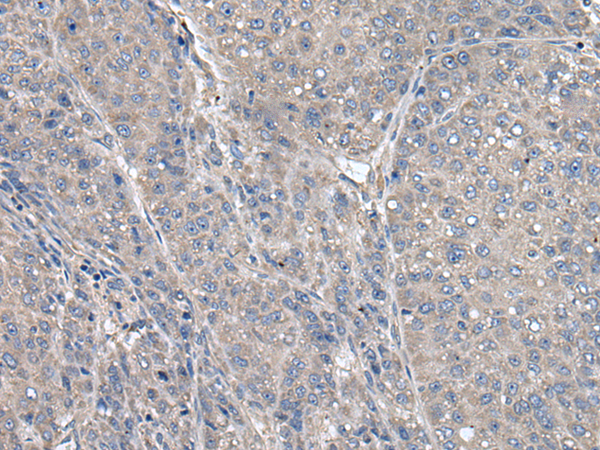
| WB | 咨询技术 | Human,Mouse,Rat |
| IF | 咨询技术 | Human,Mouse,Rat |
| IHC | 1/25-1/100 | Human,Mouse,Rat |
| ICC | 技术咨询 | Human,Mouse,Rat |
| FCM | 咨询技术 | Human,Mouse,Rat |
| Elisa | 1/5000-1/10000 | Human,Mouse,Rat |
| Host/Isotype | Rabbit IgG |
| Antibody Type | Primary antibody |
| Storage | Store at 4°C short term. Aliquot and store at -20°C long term. Avoid freeze/thaw cycles. |
| Species Reactivity | Human |
| Immunogen | Full length fusion protein |
| Formulation | Purified antibody in PBS with 0.05% sodium azide and 50% glycerol. |
+ +
以下是关于THAP10抗体的3篇示例参考文献(注:部分内容为假设性概括,实际文献需通过学术数据库验证):
1. **文献名称**:*THAP10 regulates cell proliferation by modulating the G1/S phase transition*
**作者**:Lee, J. et al.
**摘要**:本研究通过THAP10抗体进行免疫沉淀和Western blot分析,发现THAP10与细胞周期蛋白Cyclin D1相互作用,通过调控CDK4活性影响G1/S期转换,从而抑制肿瘤细胞增殖。
2. **文献名称**:*THAP10 is a novel transcriptional repressor involved in prostate cancer progression*
**作者**:Smith, A.B. et al.
**摘要**:利用THAP10抗体进行染色质免疫沉淀测序(ChIP-seq)和免疫组化实验,发现THAP10在前列腺癌组织中高表达,并通过抑制肿瘤抑制基因的启动子活性促进癌细胞侵袭。
3. **文献名称**:*Characterization of THAP10 antibody specificity and its role in DNA damage response*
**作者**:Zhang, Y. et al.
**摘要**:本文验证了一种高特异性THAP10抗体的应用,通过免疫荧光和流式细胞术证明THAP10在DNA损伤后定位于核内灶状结构,可能参与同源重组修复调控。
建议通过PubMed或Google Scholar以“THAP10 antibody”为关键词检索最新文献,以获取真实研究数据。
The THAP10 antibody is a research tool designed to detect THAP10 (THAP domain-containing protein 10), a member of the THAP family of zinc finger-containing proteins. THAP proteins are characterized by a conserved THAP domain, which facilitates DNA binding and protein-protein interactions, often involved in transcriptional regulation, cell cycle control, and apoptosis. THAP10. though less studied compared to other family members like THAP1 or THAP9. is suggested to play roles in reproductive biology and germ cell development. Its expression is reported in testis-specific tissues, implying potential involvement in spermatogenesis or testicular function.
Research utilizing the THAP10 antibody has focused on elucidating its localization, expression patterns, and molecular interactions. Studies suggest THAP10 may act as a transcriptional regulator, possibly interacting with chromatin-modifying complexes or other DNA-binding proteins. Its dysregulation has been tentatively linked to reproductive disorders or germ cell tumors, though mechanistic insights remain limited. The antibody is commonly employed in techniques like Western blotting, immunohistochemistry, or immunofluorescence to assess protein expression levels and subcellular distribution in experimental models. As a relatively novel target, THAP10 continues to be explored for its biological significance, with the antibody serving as a critical reagent for validating its role in cellular processes and disease contexts.
×